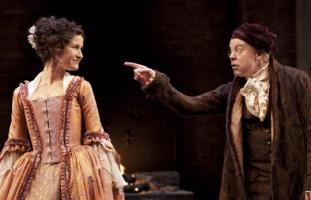She Stoops To Conquer Review 2012
Whether you classify this play as a romantic comedy or comedy of manners, farce or satire, there is a great deal still to be enjoyed in Oliver Goldsmith's 'She Stoops to Conquer', first performed in 1773. In fact, Goldsmith classified it as a 'laughing comedy', to contrast with the then widespread 'sentimental comedy', and his main aim was to make the audience laugh. This revival by Jamie Lloyd certainly achieves the writer's ambition, thanks to spirited, warm-hearted characterisations that draw-in the audience with nods and winks, among other devices.
A loud cow moo right at the start aptly sets both the tone and the location. We are in the country and in an 'old rumbling mansion' complete with huge fireplace and real roaring fire, owned by Mr and Mrs Hardcastle. The latter complains that they never leave their home to 'rub off the rust' and that her husband is content to remain there because he 'loves everything that's old'. The pair live with their miscreant son Tony, Mrs H's son from her first marriage, their daughter Kate, and Constance Neville whose jewel-based fortune is guarded and coveted by Mrs Hardcastle.
Mr Hardcastle hopes to marry off Kate to Marlow, the son of a friend, and Mrs Hardcastle wants Constance to marry Tony to keep Constance's jewels in the family. But Constance is keen on Hastings, Marlow's friend, so conflict is immediately placed firmly on the agenda. On their way to the Hardcastle's house from London, Marlow and Hastings stop at an inn, The Three Pigeons, for directions. Tony is now carousing with his pals there and tells them that they can stay at another inn just down the road but which is actually the Hardcastle home. So, the scene is set for confusion and misunderstandings, which the alternative title of the play, 'Mistakes of the Night' amply conveys.
Immediately after the cow moo at the start, two doors open at each side of the set and out pop numerous heads to sing us into the first scene. Rousing and fairly raucous, Ben and Max Ringham's excellent musical interludes provide refreshing distraction between scenes, and all the characters take part in the singing and dancing. Mark Thomson's solid and detailed design amply suggests a well-worn residence which, while not dilapidated, has seen better times and thus possible to mistake for an old inn. Huge, leafless trees stand around the perimeter of the Hardcastle house and are more fully utilised in a later scene where they turn into a spooky wood that seems to stretch out to infinity.
Harry Hadden-Paton as Marlow and John Heffernan as Hastings are the two townie suitors who are a kind of 'Hooray Henry' double act, at least initially. But we warm to them as they treat their host's home with little more than contempt, throwing orange peel on the carpet and lounging on the furniture. Sophie Thompson's Mrs Hardcastle may be extremely exaggerated, but she's wonderfully funny nonetheless, one minute winking at the audience and the next grimacing and mumbling incomprehensibly. David Fynn's Tony turns out to be not so much a devious degenerate than an impish prankster. He has one of the best visual gags in the show when he gives the suitors directions in the inn with a stuffed rabbit.
Jamie Lloyd manages to steer a fine line, allowing occasional (and enjoyable) excesses but still keeping the whole thing under control, and just on this side of outrageous farce. Mr Lloyd's production also maintains a fine balance between catering for the sophisticated tastes of a modern audience, while remaining faithful to the original play. But given that Goldsmith wanted the audience to laugh, I doubt he would have much cause for complaint with this treatment and a great deal to admire and applaud.
"Fresh, spirited and often blissfully funny staging"
Charles Spencer for The Telegraph
"Jamie Lloyd's production is a collective success which leaves the theatre echoing with the sound of the audience's happiness."
Michael Billington for The Guardian
"Boisterously funny production ."
Paul Taylor for The Independent
"It's joyous stuff - broad yet polished."
Henry Hitchings for The Evening Standard
External links to full reviews from popular press
Telegraph - Guardian - Independent
Originally published on
